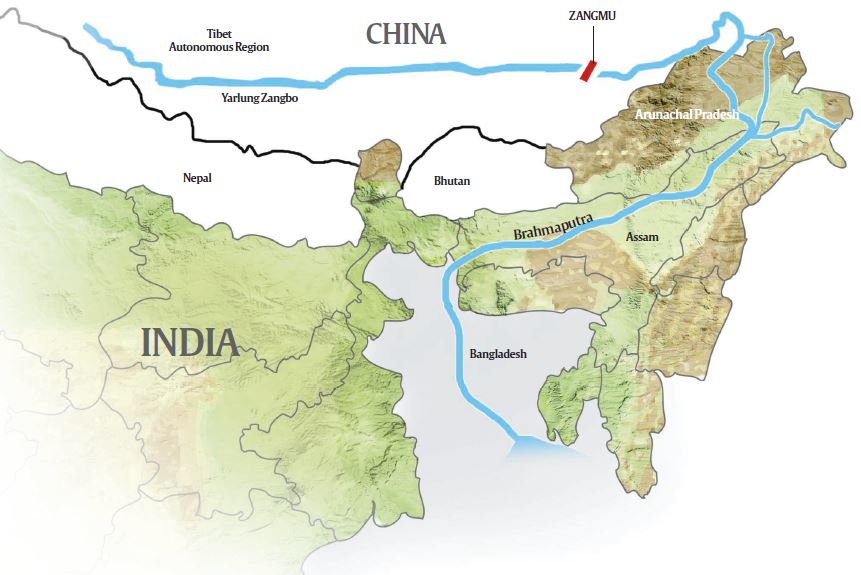31-AUGUST-2018 : TOD
Karnataka
- Solid Waste management to reach big villages

- In a bid to ensure cleanliness in rural areas, Karnataka is set to introduce solid waste management, including door-to-door collection of garbage, in a few chosen villages on a pilot basis.
- In the absence of any SWM system, villagers generally dump garbage at dumping and manure pits. Earlier, the system would work well as almost all the things used by villagers were organic.
- But now several non-decomposable items, particularly plastic, have entered in a big way even in rural areas. These are coming in the way of maintaining rural cleanliness.
- Mekedatu Project


- The recent heavy rain and floods have resulted in Karnataka releasing 310 tmcft of Cauvery water to Tamil Nadu since the beginning of this water year (since June) as against the scheduled 82 tmcft, as the State does not have adequate storage facility.
- This has led to the State intensifying its focus on getting the Centre’s nod to build a balancing reservoir across Cauvery at Mekedatu.
- A balancing reservoir with a storage capacity of 67 tmcft would help in storing excess water which can be released to Tamil Nadu during dry months, in addition to taking care of drinking water requirements of several cities and towns of Karnataka.
- He observed that Karnataka was legally bound to ensure release of water to Tamil Nadu on the basis of monthly quota.
- There was no provision to adjust any excess releases in a month to the future months.
- The abrupt release of huge quantum of water, which was in excess of scheduled release, was of no use even to Tamil Nadu as it would finally reach the sea. He maintained that Tamil Nadu too had begun to realise the need for building a balancing reservoir in Karnataka for ensuring scheduled water releases.
- The proposed project that involves submergence of about 4,000 acres of forest land would come up in Kanakapura Assembly constituency, while a small parcel of land would be from the neighbouring Malavalli.
- Nilgiri tahr population increases

- In a heartening development for conservationists, a recent census has revealed that the population of the Nilgiri tahr (an endangered mountain goat) at the Mukurthi National Park has grown by an impressive 18% in the last two years, from 480 to 568.
- If that is the good news, the bad news is that the population also faces several threats.
- The continuing spread of invasive species of flora, such as wattle and pine, and exotic weeds like scotch broom ( Cystisus scoparius ) and gorse, which end up diminishing grazing land.
- The rise in the animals’ population has led to a few herds migrating out of the national park, into the erstwhile Nilgiris South Forest Division.
General
- BIMSTEC Summit in Kathmandu
- India was committed to working with the BIMSTEC member states in the critical sector and to combating the menace of terrorism and drug trafficking.
- The BIMSTEC is a regional grouping comprising India, Bangladesh, Myanmar, Sri Lanka, Thailand, Bhutan and Nepal. The grouping accounts for 22% of the global population, and has a combined gross domestic product of $2.8 trillion.
- the region had become a meeting point for India’s ‘Neighbourhood First’ and ‘Act East’ policies.
- Uber air taxi service
/cdn.vox-cdn.com/uploads/chorus_image/image/61070967/ECRM003_hero_shot__1___1_.0.jpg)
- Uber had named Dallas and Los Angeles as its first two launch cities in the U.S. for introducing its aerial taxi service and has been on the lookout to select an international city as its third partner. It has now short-listed five countries — India, Japan, Australia, Brazil and France — and one of them will become the first Uber Air City outside of the U.S.
- Uber hopes to start operating demonstrator flights starting 2020 and beginning commercial operations in 2023 in the three cities.
- Indian cities like Mumbai, Delhi and Bengaluru are among the most congested cities in the world and travelling even a few kilometres can take more than an hour.
- The Uber Elevate team will engage in talks with stakeholders across major cities in these countries, and announce the chosen Uber Air international city within the next six months.
- Artificial flood threatens Arunachal Pradesh : China factor


- High discharge of water from China, the highest in 50 years, is threatening to submerge at least 12 villages along the river Siang in Arunachal Pradesh.
- The “unusually high” discharge indicates sudden release of water from man-made barriers or a natural dam that was formed due to landslides caused by major earthquakes in the Tibetan region of China in November 2017.
- SC/ST reservation :Court observations
- Reservation is State-specific, but Delhi is a ‘miniature India’ where the “pan-India reservation rule” applies, the Supreme Court held .
- a person belonging to a Scheduled Caste in one State cannot be deemed to be a Scheduled Caste person in relation to any other State to which he migrates for the purpose of employment or education
- The benefits of reservation provided for by the Constitution would stand confined to the geographical territories of a State/Union Territory in respect of which the lists of Scheduled Castes/Scheduled Tribes have been notified by the Presidential Orders issued from time to time.
- The Constitution Bench was answering a reference made to it in Bir Singh versus Delhi Jal Board, a 2013 case, on the legal question whether a Scheduled Caste person from a State would be accorded the same concessions in employment in another State.
- Law commission : Rethink Section 124A
- The Commission has invited public opinion on the prospect of either redefining or doing away with Section 124A in the “largest democracy of the world, considering that right to free speech and expression is an essential ingredient of democracy.”
- Why should India retain sedition when the British, who introduced sedition to oppress Indians, have themselves abolished the law in their country, the Commission asked. Sedition attracts imprisonment from three years to life.
- The Commission said an “expression of frustration over the state of affairs cannot be treated as sedition.”
- The consultation paper was published a day after the Supreme Court lashed out at the government, saying “dissent is the safety valve of democracy,” while hearing a petition challenging the pan-India crackdown and arrests of five activists.
- Law Commission :for Simultaneous election
- The Law Commission of India recommended holding of simultaneous elections to the Lok Sabha and the State Assemblies to save public money.
- The Commission, in draft recommendations, said simultaneous polls would help the government of the day focus on “developmental activities rather than in electioneering.”
- The exercise would also stop the drain on the administrative set-up and security forces. Simultaneous elections would further ensure better implementation of government policies on time.
- As one of the options, the Commission recommends that elections to 12 State Assemblies and one Union Territory (with legislature) can be synchronised with the general elections in 2019. Simultaneous polls can be achieved if there is “political will” and if the States “agree voluntarily.”
- It said elections to the Assemblies of five States are due with the elections to the Lok Sabha and therefore already stand synchronised.
- Food Fortification Regulations 2018
- FSSAI has notified the Food Fortification Regulations, 2018, while food business operators (FBOs) need to comply with the provisions of these regulations by January 1, 2019.
- The provisions of these regulations shall supersede the standards for fortification of food set out in any regulations, orders, or guidelines issued under the Act.
- The new standards now provide a minimum and maximum range for fortification of staples like wheat flour (atta), maida, rice, salt, vegetable oil and milk, while the dosage of the micronutrients has been adjusted to provide 30 to 50 per cent of the daily requirements.
- In milk and oil, the unit of dosage has been changed to microgram Retinol Equivalent for Vitamin A and microgram for Vitamin D from IU. In wheat flour and rice fortification, other sources of iron have been added, while vanaspati fortification has been excluded.
- According to the country’s apex food regulator, since the adoption of the standards, 62 top companies and their 110 brands of all five fortified staples are available in the open market across the nation. Leading the movement, the oil and milk industry, with 47 per cent packaged refined edible oil industry and 21 per cent of the organised milk industry is fortifying their products as per FSSAI standards.
- Juvenile Justice Amendment Bill,2018 :Speed up adoption
- As of July 20, 2018, there are 629 cases for adoption pending in various courts across the country. Due to delay in the issuing of adoption orders by the courts, children continue to stay in childcare institutions, even after getting a family.
- The Juvenile Justice (Care and Protection of Children) Amendment Bill of 2018 seeks to remedy the situation. In the best interest of the child, it proposes to amend the Juvenile Justice Act to empower the District Magistrate, instead of the court, to issue adoption orders.
- This would ensure timely processing of adoption cases and provide orphaned, abandoned and surrendered children with familial care and protection.
- The Juvenile Justice Act of 2015 introduces comprehensive provisions for children in conflict with the law and children in need of care and protection. It was enacted keeping in view the standards prescribed in the Convention on the Rights of the Child, the United Nations Millennium Rules for the Administration of Juvenile Justice, 1985 (the Beijing Rules), the United Nations Rules for the Protection of Juveniles Deprived of their Liberty (1990), the Hague Convention on Protection of Children and Co-operation in respect of Inter-country Adoption (1993) and other related international instruments.
- Chapter 8 of this Act deals with adoption. Subsection (1) of Section 56 of the Act says “adoption shall be resorted to for ensuring right to family for the orphaned, abandoned and surrendered children.” Section 63 of the Act states that the adoption is final on the issuance of the adoption order by the court concerned. Subsection (2) of Section 61 of the Act provides that “the adoption proceedings shall be held in camera and the case shall be disposed of by the court within a period of two months from the date of filing the adoption.”




/cdn.vox-cdn.com/uploads/chorus_image/image/61070967/ECRM003_hero_shot__1___1_.0.jpg)

